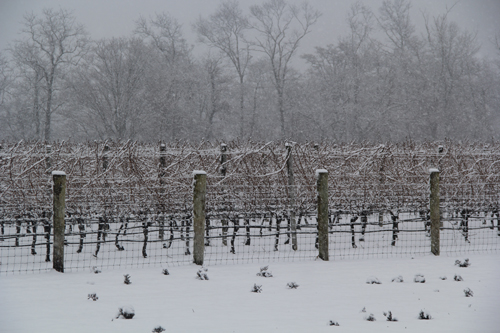North Fork farmers welcoming snow, deep-freeze weather

Local farmers are welcoming this winter’s snowy, freezing weather because they find the cold temperature helps the soil and growing process.
Long Island saw 25.2 inches of snow last month, which is significantly higher than the January average of 6.7 inches, said National Weather Service meteorologist Joe Picca.
January’s average temperature of 27 degrees — nearly 3 degrees below average — has also kept the North Fork’s soils frozen. The colder weather coupled with the snow-covered ground is useful for agriculture purposes, some local growers say.
“Deep frost is always good for soil,” said Philip Schmitt of Schmitt’s Family Farm in Riverhead. “It’s nothing negative. If anything, it’s probably good. It kills the insects and loosens the soil up.”
Mr. Schmitt said that once the soil thaws out, it unpacks and makes room for roots to grow come spring.
Rob Goerler of Jamesport Vineyards said the cool temperatures have helped to ensure the areas’ grape buds lay dormant.
“We don’t want the warming up of the grounds,” Mr. Goerler said, adding that snow helps the growing process. “It adds a blanket of insulation, keeping the grounds from warming up.”
Although the region has also recently experienced a few days of 50-degree weather, the drastic temperature changes weren’t sustained long enough to impact Mr. Schmitt’s spinach crop.
Mr. Goerler said periods of high temperatures could force buds to grow early, making them more susceptible to damage if followed by another deep freeze soon after.
“This particular weather doesn’t effect the grapes,” he said. “The snow is good for us.”
Joe Gergela, executive director of the Long Island Farm Bureau, said high snow accumulations, such as last year’s blizzard, could damage greenhouses. Heavy precipitation can damage the lining of greenhouses and break underneath the snow’s weight, he said.
Greenhouse growers also tend to have higher fuel costs for heating growing areas during frigid temperatures, Mr. Gergela said.


